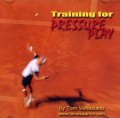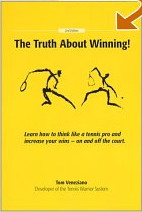When attempting to find solutions to match-play problems, do not fall into a trap that can hamper even the most experienced player. That pitfall is expecting your solutions to work immediately. Often it takes time for your change in tactics to kick in and begin tilting the match in your favor.
Here are three situations where players gave up too soon. Listen to their reasons and try not to repeat the same mistakes yourself.
The first situation is a doubles match where the team that was losing (let's name them Sue and Nancy) decided to attack the net at every chance they got. The first two times they advanced to the net their opponents lobbed over their heads. Nancy and Sue huddled together for a powwow and concluded, "That's enough of that strategy!" They switched back to the original plan, lost and went home. They explained that they did not continue attacking because they felt they were getting lobbed to death. This is definitely a case of giving up on a good solution too soon.
I have never understood this "getting lobbed to death" excuse. I know it can happen, but when I watch players in a match, I see missed volleys, missed putaways at the net, poor approach shots, incorrect net positioning, and faulty overheads. And yet, some players insist, "it's those darn lobs over my head, that's why I lost."
They should try to improve their game in these other areas, so that an occasional lob over their head will not offset the benefits of a smart tactic. Most lobs are a sign of defensive play anyway. The next time you try this net attacking strategy, do not give up the net when only two lobs go over your head. Give the tactic time and begin working on your timing and rhythm for your other forecourt skills. These skills, not the lobs over your head, will typically determine whether you win or lose at the net in doubles. It's also vital to recognize that the overhead is the most lethal shot in tennis. So, practice moving back sideways to reach lobs early enough so you can really whack your overheads.
The second situation is a singles match where one of the players was hitting deep approach shots and coming to the net. Again, the first two approach shots he attempted flew a couple of feet long. His ill-considered reaction: I'm not going to do that anymore. So he stays back and abandons a smart net-rushing tactic.
Now, I know this situation is difficult because you have two opposing influences at work here. The emotional vs. the mental. The emotional influence says: "I'm not making this shot and I do not like that. Therefore I will stop." The mental influence says: "I am establishing my timing and rhythm, so whether I miss or not is not the main point. Once I establish my rhythm, I will begin making the shot." Befuddled players make the wrong choice.
The third situation is also a singles match where a player (Bob) decides to attack his opponent's (John) weak backhand. Bob attacks it successfully three times, but each time John responds with outstanding backhands. Bob abandons the tactic and settles down into his usual game plan that has repeatedly lost to John. The reason: John hit three great backhands.
Most players abandon the correct principles too soon and change to another tactic without ever giving the one they started using a chance. Mentally tough competitors do not change quickly. Instead, they keep the pressure on. They wait for the tactic to work. You should learn to do the same.
Here are two principles you should know about sticking with a smart solution. First, even if it doesn't work immediately, if you stay with it, you will continue to make your opponent concentrate to beat you. Somewhere along the line your opponent's concentration may slip, giving you the opportunity to gain the momentum and win the match. A mentally tough tennis warrior understands this and keeps the pressure on relentlessly.
Second, all players go through up-and-down cycles. They play well one moment and badly the next. Often players change their tactic when their opponent is in an up-cycle and playing well. If they would have just waited patiently, the cycle would have changed, offering them an excellent opportunity to capitalize on their strategy.
The other day I was talking with one of my readers. He reminded me of a previous article I wrote about a stonecutter. I think it applies well here. The stonecutter keeps hitting on the rock -- one hundred, two hundred, three hundred times until finally one of the blows cracks the rock open. When the stonecutter had reached fifty blows, if he had concluded, "Nope, I can't do it, nothing is happening" and quit, the success of cracking the rock would never have happened. It's important to note that it was not the last blow that cracked the rock, but the cumulative effect of this consistent strategy that assured his success. Similarly, the relentless pressure of a sound tactic often takes a mental and/or physical toll on your opponent. And, like a boxer taking too many punches, he weakens and eventually gets knocked down or out.
In conclusion, do not fall prey to instant gratification so common in today's society. Avoid the quick-fix solution. Be patient. Short-term sacrifice for long-term gain may not be easy at first, but it is the signature of a true Tennis Warrior.










 You will join 13,000 other subscribers in receiving news of updates to the Tennis Server along with monthly tennis tips from tennis pro Tom Veneziano.
You will join 13,000 other subscribers in receiving news of updates to the Tennis Server along with monthly tennis tips from tennis pro Tom Veneziano. 